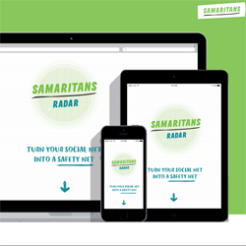Kirsty Weakley thinks the backlash to the Samaritans’ web application is unfair and worries it might discourage other charities from dreaming up innovative uses for technology.
Last week we received a press release from Samaritans about the launch of its web application that monitors peoples' Twitter contacts for signs that they might be struggling to cope. "Clever idea" I thought, and although it didn’t make the cut at our morning news meeting, I filed it in my ‘charities using technology well' folder and thought no more about it.
I was therefore surprised to see a flurry of online criticism claiming that the app was a breach of peoples' privacy, with the Information Commissioner’s Office saying it is looking into complaints. The charity has been busy in its defence of the tool to the extent of issuing three separate statements to reassure Twitter users.
But the danger is that this sort of alarmist and uninformed criticism could discourage Samaritans and other charities from investing in innovative ways to deliver services through technology.
Samaritans Radar works in a similar way to many other apps. Users authorise the app to monitor their Twitter timeline, and it will comb it for any tweets which might suggest someone is experiencing mental health problems. If it detects this it will send an alert through the app and provide the user with advice on how to support them.
The charity stresses that it has been developing the app for more than a year and has worked with stakeholders and experts before the public launch; importantly this is not something that was dreamt up last week on the back of an envelope but part of the charity’s wider strategy which also involves signs on railway platforms and so on.
This all seems like a remarkably sensible idea – there are some people whose Twitter profiles I check regularly to make sure that they are ok; this app effectively automates that process and means I can relax and enjoy using Twitter. I will certainly be signing up to the app and be encouraging others to do the same.
Tweets have an average life of ten minutes, so unless you are checking it constantly it’s normal to miss updates from people. If someone I followed on Twitter suggested that they might harm themselves and I missed it I’d feel incredibly guilty. On the flipside if someone phoned me to see if I was ok after being concerned by an update I had posted on Twitter, I wouldn’t be worried about how they had seen the update - I'm guessing I'd just be pleased that they cared enough to call.
The criticism that vulnerable people will censor themselves online seems unjustified. Joe Ferns, Samaritans' executive director of policy, research and development, said: “We know from research that vulnerable individuals go online to call for help, in the hope that someone will reach out to them, so we developed Samaritans Radar particularly for Twitter users who want to be able to support their friends.”
It is a clever use of technology but by no means groundbreaking as there are many other Twitter monitoring tools already in use. As a journalist one of my favourites is Bioischanged, which alerts me to changes in the biography details of the people you follow - this is good for spotting when people in the sector change jobs (but more often than not just when they add or remove a comma!).
When Twitter first launched it was often referred to as a micro-blogging platform, and while the term now seems quaint, it is important to remember that most of what is said on Twitter is being said publicly. There is the option of a private account but generally it’s best to treat Twitter like one big conversation - if you wouldn’t stand up in a room of 1,000 people and shout it you probably shouldn’t tweet it.
To end on a positive note, so far more than 3,000 people have signed up to the app indicating that the response has not been exclusively negative. I hope the criticism Samaritans has endured will not discourage charities from pursuing new trends in digital technology.










